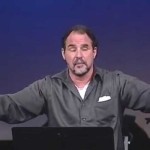We run our website the way we wished the whole internet worked: we provide high quality original content with no ads. We are funded solely by your direct support. Please consider supporting this project.
Open Theism Timeline
Open Theism Timeline by Tom Lukashow
An argument that is frequently raised against the open view is that it is a recent innovation. Paul Eddy had discovered Calcidius, a fifth century advocate, and I and others knew of L.D. McCabe and Billy Hibbard, two 19th century advocates. But that was about it – until I met Tom Lukashow.
Tom is a lawyer in Florida who has spent much of his spare time over the last thirty years researching the history of the open view. And what he has discovered is, at least to me, absolutely amazing! In preparation for the Open2013 Conference that will be held at Woodland Hills Church next week, I asked Tom if he could bring all his research together into one single annotated time line, and he has graciously obliged.
And now I share it with you. On this chart you will find that from 1642 up to the 1941, there has been a steady stream of scholars advocating the open view. I have not read all of these works, but those I have read– e.g. Fancourt (1720’s-30’s) Ramsey (1748), Bromley (1820), McCabe (1870’s), Brents (1874) and a few others – defend this view using many of the same arguments that advocates of openness today use. In fact, I’ve found in several of the works Tom has sent me several arguments I’ve not seen before. More importantly, this chart demonstrates that the open view is just about as old as Protestantism is! It can therefore no more be dismissed as an innovation than can Lutheranism, Calvinism or any other expression of the Protestant faith.
We should all tip our hats to Tom Lukashow. His tireless labor has done us all a tremendous service! Thank you Tom!
Category: Essays
Tags: Essay, Open Theism, Tom Lukashow, Woodland Hills Church
Topics: Open Theism
Related Reading

God’s Moral Immutability
Classical theologians from the fourth and fifth centuries on were very concerned with protecting their understanding of the metaphysical attributes of God—like timelessness, immutability, impassibility—by assessing biblical portraits that conflicted with these attributes to be accommodations. However, once we resolve that all our thinking about God must be anchored in the cross, our primary concern…

Sermons: Hanging in the Balance
Prayer is a fancy word for talking to God. In this short sermon clip. Greg Boyd introduces what prayer is designed for and what it can be used for. The Bible shows us that our prayers make a difference in this world. Yet, our picture of God doesn’t always line up with that truth.…

When Did You Let Go of Your Calvinist Beliefs? (Podcast)
Greg talks about his unusual transformation out of Calvinism. Episode 471 The Interview: http://traffic.libsyn.com/askgregboyd/Episode_0471.mp3 Photo by Paola Franco on Unsplash.com

Does God Intervene?
Given the vast influence of angelic and human free will, what influence does God have in determining what comes to pass? While God has an important role to play in anticipating and creatively responding to decisions agents make, is God only a responder? Does he have anything to do with what’s going on in creation?…

What is the significance of Numbers 11:1–2?
The Lord was in the process of judging Israel by fire when Moses interceded in prayer “and the fire abated.” A common sense reading of the verse suggests that the fire would have continued had Moses not prayed. Scripture is full of examples of God changing his plans in response to human prayer and repentance.…

The Case For Believer’s Baptism
In this essay I briefly present my reasons for believing that baptism is intended only for people who are old enough to responsibly choose to become disciples of Jesus. I will first offer several biblical arguments, then offer a supporting argument and conclude by responding to several objects to believer’s baptism. Biblical Arguments Baptism…
